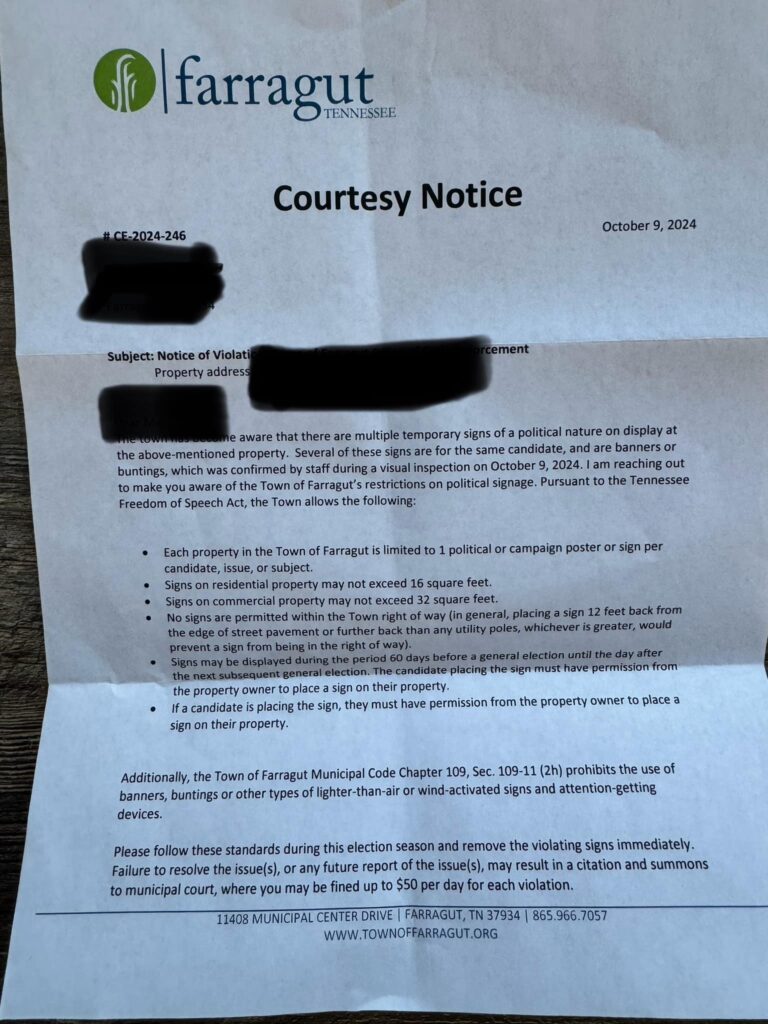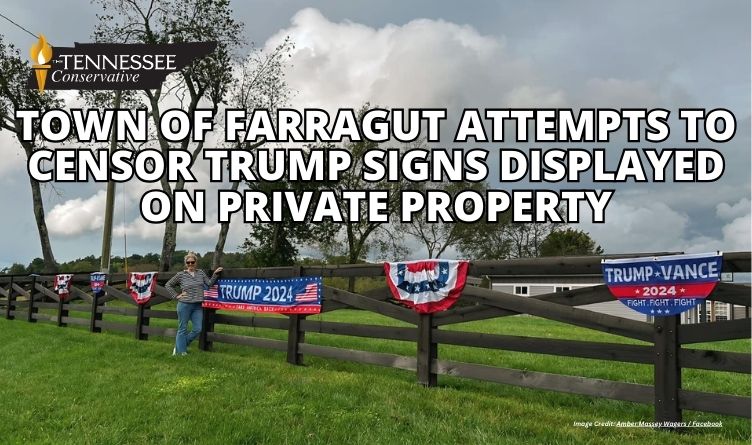Image Credit: Amber Massey Wagers / Facebook
The Tennessee Conservative [By Adelia Kirchner] –
Early voting in Tennessee came to a close on Thursday this week and Election Day looms near. Across the country, yards remain decorated with political signs and banners supporting either the Trump-Vance campaign or the Harris-Walz campaign.
But despite the fact that U.S. citizens of many different political ideologies reside in Farragut, Tennessee, the town’s leadership does not seem to want its residents to express their political support, even on their own private property.

In an October 9th notice, Farragut resident Amber Massey Wagers was informed that the Trump-Vance banners and American flag buntings hung up across her property fencing, were a violation of the town’s municipal code and political signage restrictions.
“The town has been made aware that there are multiple temporary signs of a political nature on display at the above-mentioned property,” read the notice. “Several of these signs are for the same candidate, and are banners or buntings, which was confirmed by staff during a visual inspection.”
The notice goes on to reference the Tennessee Freedom of Speech Act and state that the Town of Farragut “allows” the following:
• Each property in the town of Farragut is limited to 1 political or campaign poster or sign per candidate, issue, or subject.
• Signs on residential property may not exceed 16 square feet.
• Signs on commercial property may not exceed 32 square feet.
• No signs are permitted within the Town right of way (in general, placing a sign 12 feet back from the edge of street pavement or further back than any utility poles, whichever is greater, would prevent a sign from being in the right of way).
• Signs may be displayed during the period 60 days before a general election until the day after the next subsequent general election. The candidate placing the sign must have permission from the property owner to place a sign on their property.
• If a candidate is placing the sign, they must have permission from the property owner to place a sign on their property.
“Additionally, the Town of Farragut Municipal Code Chapter 109, Sec. 109-11 (2h) prohibits the use of banners, buntings or other types of lighter-than-air or wind-activated signs and attention-getting devices,” the notice continues.
Wagers was informed via this notice, that she needed to remove the “violating signs” immediately and that failure to do so or a future report of the same issue could result in a citation and summons to municipal court along with a fine of up to $50/day for each violation.

Upon receiving this notice, Wagers posted the letter and photos of the signs and buntings on her property to social media asking, “What’s the likelihood they actually summon me to court?”
“I don’t live in a neighborhood for a reason,” she continued. “Last election I had several signs and received no notice. I know of three separate properties in Farragut that have American flag buntings and there is a gentleman down the road with a large democratic senator sign and I am tempted to go knock on his door and ask him if he received the same letter. I’d understand if it wasn’t well kept or had vulgar language but this is ridiculous to me.”
Commenters on Wagers’ social media post shared similar thoughts.
Sherri Smith-Bush said, “Free speech. If it’s your property I’d tell them to go pound sand. I’d take a picture of your democratic neighbor’s stuff and send it back to them and say when you make him take his crap down then MAYBE I’ll remove mine.”
Another commenter, Leanne Hall, expressed her disappointment with this type of censorship taking place in Tennessee.
“Ridiculous!” she wrote. “We moved to Tennessee to get away from this kind of BS. Sad to see this happening.”
“If it’s private property and you own it or have permission from the owner, they can send all of the courtesy notices they want, they have no legal standing,” wrote Eric Dutra. “They will just harass you until you comply. The town ka-rens need to worry about more important things than banners and buntings”
Yet another commenter, Danielle Lynn, referenced City of Ladue v. Gilleo, 512 U.S. 43, saying, “Supreme Court ruled on this. They can’t have separate rules for political signs as any other signage. Looks like Farragut is breaking the law.”

When Wagers brought the issue to Rep. Jason Zachary’s (R-Knoxville-District 14) attention, she said he responded by saying that towns like Farragut and Franklin had initially wanted to ban political yard signs completely.
In order to prevent local municipalities from doing that, state lawmakers passed legislation allowing every homeowner in Tennessee to put up at least one yard sign per candidate or issue each political season.
This is unfortunately not a stand-alone issue and remains eerily similar to when Franklin resident, Duane Charlton, was cited for violation of a zoning ordinance when he displayed “too many” flags in his front yard.
Charlton’s front yard display consisted of seven American flags, neatly lining the curb of his home on Birchwood circle and two additional flag poles holding two flags each.
According to Charlton he received a notice from Franklin city officials on August 22nd.
The city then issued him a citation when he refused to remove any of the flags from his property.
Charlton stated in September that he does not intend to do so unless he is forced to and over 70 of his neighbors signed a petition for the city to reconsider the zoning ordinance.
“I don’t think I’m wrong in my beliefs, and I’m going to fight until they tell me I can’t,” said Charlton.


About the Author: Adelia Kirchner is a Tennessee resident and reporter for the Tennessee Conservative. Currently the host of Subtle Rampage Podcast, she has also worked for the South Dakota State Legislature and interned for Senator Bill Hagerty’s Office in Nashville, Tennessee. You can reach Adelia at adelia@tennesseeconservativenews.com.



2 Responses
According to Farragut’s Codes of Ordinances: https://library.municode.com/tn/farragut/codes/code_of_ordinances?nodeId=PTIICOOR_CH109SI
Chapter 109 – SIGNS, Sec. 109-11. – General restrictions. under subsection a2m: Prohibited signs:
“Signs attached to, suspended from, or painted on any vehicle or similar mobile structure which is regularly parked or situated on any street, parking lot, or private property when one of the purposes of so locating such vehicle or similar mobile structure is to display, demonstrate, advertise, or attract the attention of the public;.”
This is the only place where Private Property is mentioned. But note that it refers to signs on a mobile structure.
I conclude that a private property owner can put up whatever sign they want on their non-mobile property.
The town can’t do a damn thing about it. They violate the property owner’s 1st amendment right if they try to go after someone.
2021 Tennessee Code
Title 2 – Elections
Chapter 7 – Procedure at the Polling Place
§ 2-7-143. Tennessee Freedom of Speech Act
Universal Citation:
TN Code § 2-7-143 (2021)
This section shall be known and may be cited as the “Tennessee Freedom of Speech Act.”
Notwithstanding any law to the contrary, during the period beginning sixty (60) days before a general election until the day after the next subsequent general election:
This state, a local government, or any other political subdivision of this state:
Shall not regulate the shape or quantity of political or campaign posters or signs placed on private property that is located more than one hundred feet (100′) from a polling place if the signs or posters are placed on the property by the owner of the property or any lawful resident of a residence on the property;
May prohibit, notwithstanding subdivision (b)(1)(A), any political or campaign poster or sign covered by this section from exceeding:
For commercial property, thirty-two square feet (32 sq. ft.) in size; and
For residential property, sixteen square feet (16 sq. ft.) in size; and
Notwithstanding subdivision (b)(1)(A), may adopt reasonable restrictions limiting the number of political campaign signs or posters that may be placed on property; provided, that such restrictions authorize an owner or resident to place at least one (1) poster or sign on the property per candidate, issue, or subject; and
A homeowners’ association shall not, by covenant, condition, restriction, or rule, prohibit the display of political or campaign posters or signs placed on private property by the owner of the property or any lawful resident of a residence on the property. A homeowners’ association may adopt reasonable covenants, conditions, restrictions, or rules with respect to the placement of political or campaign posters or signs placed on homeowner association common space and private property maintained by the owner or resident, including limiting the size of campaign posters or signs in those common and private property areas to four square feet (4 sq. ft.).
A lessor of residential property may require a lessee to obtain the written permission of the lessor prior to placing any political or campaign posters or signs on such residential property. Any such requirement must be included in the lease or rental agreement.
This section applies to any clause, covenant, condition, restriction, or rule contained in any agreement or contract between a homeowners’ association and property owner or between a lessor and lessee executed or modified after July 1, 2017.